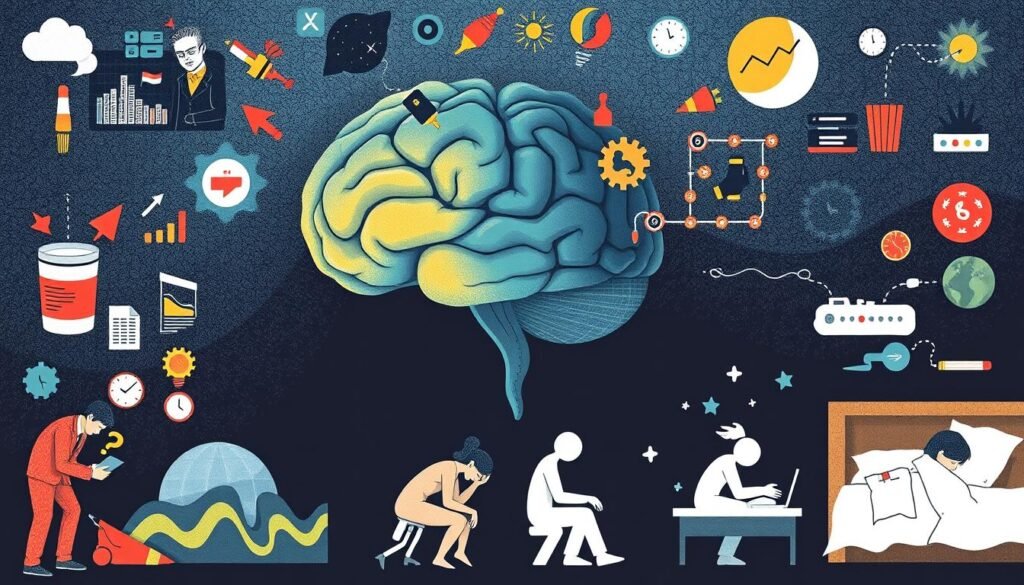Did you know nearly 80% of adults feel stressed every day? This constant stress can lead to something known as adrenal fatigue. It was first mentioned in 1998 by James Wilson, PhD. Despite not being officially recognized by groups like the Endocrine Society, adrenal fatigue’s effects are real. Symptoms include tiredness, craving salty snacks, and struggling to bounce back from stress or sickness, impacting around 40% of those under chronic stress.
This guide will help you understand how to fight adrenal fatigue. It talks about the symptoms, causes, and how to treat it. This includes changing your lifestyle and diet to help your recovery. If you’re facing this issue because of stress, it’s important to take action now.
Key Takeaways
- The term “adrenal fatigue” was introduced in 1998, yet it remains unofficial in medical contexts.
- Chronic stress affects up to 80% of adults, significantly impacting adrenal health.
- Common symptoms of adrenal fatigue include fatigue, cravings, and mood disturbances.
- Adrenal fatigue treatment often involves lifestyle adjustments and dietary changes.
- Conventional medicine does not recognize adrenal fatigue, making proper diagnosis and treatment essential.
- Up to 60% of individuals with adrenal fatigue may experience digestive issues related to stress.
- Engaging in yoga and meditation can dramatically reduce cortisol levels, supporting recovery.
Understanding Adrenal Fatigue
Adrenal fatigue happens when constant stress overpowers the adrenal glands. These glands play a key role in controlling hormones. If their function drops, many symptoms can appear, making everyday life hard. It’s important to notice these symptoms if you’re under a lot of stress for a long time.
Adrenal fatigue usually starts with extreme tiredness that rest doesn’t fix. This is different from normal tiredness. People might also feel mood swings, have trouble sleeping, and crave salty or sweet snacks. These signs suggest issues with mineral balance and cortisol levels.
Since the late 1990s, adrenal fatigue has been a hot topic, thanks to Dr. James Wilson. But experts can’t agree if it’s a real syndrome. While some see common symptoms in sufferers, others call for more study to understand it better.
There are ways to find out if someone has adrenal fatigue. Tests look at stress response, sleep, and diet. A popular test measures cortisol with saliva over 24 hours. However, these tests still can’t give exact hormone levels.
People with chronic illnesses, like allergic asthma, might get adrenal fatigue easier because of constant body stress. Making changes in lifestyle, like exercising and getting enough sleep, can help heal and improve overall health.
It can take six to nine months to recover from adrenal fatigue. The right treatment plan depends on the person’s specific symptoms and causes. Tailoring the treatment makes it more effective.
Symptoms of Adrenal Fatigue
Dealing with adrenal fatigue symptoms can really affect your life. Many feel extremely tired, even after sleeping well. You might find yourself wanting salty foods because of low hormone levels. Also, it’s common to see changes in weight and have trouble sleeping.
Feeling overly tired can lead to other problems. These include stomach issues, confusion, and anxiety. Knowing these signs is crucial for finding the right adrenal fatigue treatment. It’s important to talk to a doctor, as these symptoms can be similar to other health issues.

Also, you might get sick more often. This could be a sign to look deeper into what’s causing your symptoms. The idea is that too much stress might cause adrenal fatigue. Yet, doctors still debate about this condition. Since these symptoms can match other diseases, getting a full check-up is advised. This helps rule out other issues like thyroid problems or lack of iron.
For more tips on dealing with fatigue, check out this guide. It talks about the importance of eating well and exercising. These changes can help you feel better and improve your health overall.
Causes of Adrenal Fatigue
Adrenal fatigue starts due to many reasons. Chronic stress is a big cause. Emotional and physical stress, such as long-term sickness, hard lifestyles, and not eating right, can stress the adrenal glands. This stress can lead to less hormone production. Eating poorly also affects adrenal health, showing the need for vital nutrients.
It’s important to know what causes adrenal fatigue to manage and recover from it. Symptoms include always feeling tired, problems sleeping, and wanting salt and sugar. These signs can come from many health issues. This makes it hard to find out what’s really wrong.

Doctors often suggest changing your lifestyle to treat adrenal fatigue. They advise managing stress, eating better, working out, and getting enough sleep to improve health.
The idea of adrenal fatigue is still up for debate among doctors. Yet, it’s key to tackle chronic stress and lifestyle choices. Doing so helps in recovery and keeps your adrenal glands healthy.
How to Treat Adrenal Fatigue
Treating adrenal fatigue involves looking at both your mind and body health. Key to healing is managing stress well. Also, making dietary changes for recovery is vital to feel better.
Addressing Chronic Stress
Chronic stress affects how well our adrenal glands work, often leading to less hormone production. Using stress-reduction techniques like meditation, deep breathing, and relaxing activities can lessen adrenal stress. Adding in regular exercise helps too. It lifts your spirits and improves your sleep, which is great for fighting adrenal fatigue.
Dietary Changes for Recovery
Eating the right foods is crucial for healing. A diet full of whole, nutrient-rich foods keeps your blood sugar stable and supports your adrenals. To help, it’s suggested to:
- Add healthy fats, such as coconut and olive oil
- Pick good proteins, like lean meats and beans
- Eat a mix of veggies, especially greens, and antioxidant-rich foods like berries
However, some foods are best avoided:
- All processed foods and hydrogenated oils
- Most sugar
- A lot of caffeine and alcohol
- Many carb-rich foods
Eating every 3-4 hours keeps your energy up. Getting 8-10 hours of good sleep a night helps too. This will ease adrenal fatigue symptoms. With time, these dietary changes for recovery will boost your energy and health.

| Food Type | Foods to Include | Foods to Avoid |
|---|---|---|
| Fats | Coconut oil, Olive oil | Hydrogenated oils |
| Proteins | Lean meats, Legumes | Processed meats |
| Fruits & Vegetables | Leafy greens, Berries | Canned fruits with syrup |
| Sugars | Natural sweeteners (in moderation) | Refined sugars, Sugary snacks |
Natural Remedies for Adrenal Fatigue
Natural remedies for adrenal fatigue focus on healing the body whole. They improve adrenal health and boost overall well-being. Using herbs and staying hydrated can raise energy. It also makes managing stress easier.
Herbal Support and Adaptogens
Herbal remedies are key for adrenal fatigue support. Adaptogens like ashwagandha and holy basil help your body handle stress. They also balance hormones. Taking these herbs regularly feeds your body important nutrients. This helps you better resist stress.
Importance of Hydration
Drinking enough water is crucial for your adrenals. Aim for at least 8 ounces every few hours. Proper hydration helps control cortisol. This reduces fatigue and boosts your health. Without enough water, adrenal fatigue symptoms get worse. So, it’s vital to drink up.
Epsom salt baths offer a way to relax and hydrate. They also give you magnesium, which supports your adrenals. Pairing herbal remedies with hydration gives a full plan to fight adrenal fatigue.
Adrenal Fatigue Supplements to Consider
Those dealing with adrenal fatigue may find help from certain dietary supplements. Cortisol is vital for bodily function during stress, so healthy adrenal glands are key. When under stress for too long, adrenal glands tire, reducing cortisol. This leads to feeling tired, irritable, and anxious all the time.
Adding adrenal fatigue supplements to your daily routine could aid in recovery. Vitamins like B5, B6, B12, and C support adrenal health and make hormones. Here’s a table of helpful supplements:
| Supplement | Benefits |
|---|---|
| B Vitamins | Support energy production and hormone synthesis |
| Magnesium | Helps regulate cortisol levels |
| Ashwagandha | Reduces perceived stress and lowers cortisol levels |
| Rhodiola rosea | Improves mental performance and response to stress |
| Vitamin C | Aids in cortisol recovery and lowers blood pressure |
Before starting any adrenal fatigue treatment, talking to a doctor is crucial. They offer advice that suits your health best. Research backs the benefits of supplements like ashwagandha and magnesium in recovery. For more info, check out reputable sources, including here.
Diet for Adrenal Fatigue Recovery
A diet right for adrenal fatigue recovery is key. A good diet plan supports health and balances stress responses. It’s important to know what foods to eat and avoid to restore energy and reduce adrenal fatigue symptoms.
Foods to Include in Your Diet
Choosing beneficial foods can help your body handle stress and heal. Some top foods are:
- Whole grains like quinoa and brown rice for energy
- Lean proteins such as organic chicken, turkey, and wild fish to keep blood sugar stable
- Healthy fats, including avocados, nuts, and coconut oil, for hormone production
- Colorful veggies and low-glycemic fruits, like berries and apples, for antioxidants
- Fermented foods like yogurt and sauerkraut for gut health
- Foods rich in magnesium, such as leafy greens and legumes
Eating small meals every 3-4 hours can help with blood sugar levels. This reduces stress on the adrenal glands.
Foods to Avoid
Avoiding certain foods is as crucial as choosing the right ones. Foods to steer clear of include:
- Processed foods and refined sugars, which spike blood sugar
- Too much caffeine, which can elevate cortisol and increase fatigue
- Alcohol, because it affects blood glucose
- Gluten-containing foods if you’re sensitive to them
- Highly salted snacks and meals with a lot of sodium
Avoiding these foods helps manage adrenal fatigue better. Aim for meals and snacks at stable times daily, like breakfast between 6:00-8:00 a.m., and snacks every 2-3 hours.
Consulting with an Adrenal Fatigue Specialist
Seeing an adrenal fatigue specialist is crucial when dealing with this complex issue. They know how diverse adrenal fatigue is and make unique treatment plans. Adrenal fatigue testing like the salivary cortisol test checks hormone levels for better understanding.
Adrenal fatigue shows up as chronic tiredness, trouble sleeping, and emotional ups and downs. About 80% of sufferers wake up feeling just as tired. A specialist gives a customized plan after finding the root causes and the best solutions.
Getting the right tests is key to grasping the depth of adrenal fatigue. These thorough check-ups help carve out a specific recovery path. If stress is hard to handle, experts can help build strong coping methods. They often suggest diet changes, lifestyle adjustments, and helpful therapies to improve health.
Bioidentical hormone therapy also plays a big role in treatment, helping many with hormone balance. This method looks beyond just easing symptoms. It aims to fix the adrenal glands for lasting health benefits.
Some people ignore adrenal fatigue symptoms, thinking they just need to handle stress better. But, getting professional insight is vital. It shines a light on the problem and offers science-backed recovery paths. Working with a specialist greatly aids in tackling adrenal fatigue. They keep you informed about all the helpful treatments out there. For more info, visit consulting healthcare providers for adrenal fatigue.
Conclusion
Dealing with adrenal fatigue takes a well-rounded approach. This includes changing your lifestyle, eating better, using natural cures, and getting advice from pros. Most people with this issue, around 70%, are worn out from constant stress. They feel tired all the time, even after resting well. This shows why finding good ways to manage adrenal fatigue matters.
Those with adrenal fatigue often have hormone issues, trouble sleeping, and crave bad food. Knowing these signs helps start fixing the problem. Adding the right nutrients, managing stress, and getting tailored treatments are key steps to get better.
Putting your adrenal health first greatly boosts your energy and overall happiness. With the right knowledge and help from health experts, you can get your energy back. This leads to a healthier life and ensures a lasting recovery.